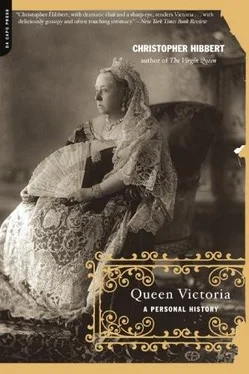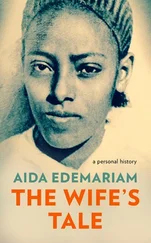Christopher Hibbert - QUEEN VICTORIA A Personal History
Здесь есть возможность читать онлайн «Christopher Hibbert - QUEEN VICTORIA A Personal History» — ознакомительный отрывок электронной книги совершенно бесплатно, а после прочтения отрывка купить полную версию. В некоторых случаях можно слушать аудио, скачать через торрент в формате fb2 и присутствует краткое содержание. Жанр: Биографии и Мемуары, на английском языке. Описание произведения, (предисловие) а так же отзывы посетителей доступны на портале библиотеки ЛибКат.
- Название:QUEEN VICTORIA A Personal History
- Автор:
- Жанр:
- Год:неизвестен
- ISBN:нет данных
- Рейтинг книги:5 / 5. Голосов: 1
-
Избранное:Добавить в избранное
- Отзывы:
-
Ваша оценка:
- 100
- 1
- 2
- 3
- 4
- 5
QUEEN VICTORIA A Personal History: краткое содержание, описание и аннотация
Предлагаем к чтению аннотацию, описание, краткое содержание или предисловие (зависит от того, что написал сам автор книги «QUEEN VICTORIA A Personal History»). Если вы не нашли необходимую информацию о книге — напишите в комментариях, мы постараемся отыскать её.
QUEEN VICTORIA A Personal History — читать онлайн ознакомительный отрывок
Ниже представлен текст книги, разбитый по страницам. Система сохранения места последней прочитанной страницы, позволяет с удобством читать онлайн бесплатно книгу «QUEEN VICTORIA A Personal History», без необходимости каждый раз заново искать на чём Вы остановились. Поставьте закладку, и сможете в любой момент перейти на страницу, на которой закончили чтение.
Интервал:
Закладка:
This proposal, conveyed precipitately in an extremely long letter soon after the Duke's arrival at Amorbach, had not at first been favourably received. Although she was only thirty-one, Princess Victoire had been married before to the grumpy, gouty Prince of Leiningen and had two children by him, Prince Charles, who was eleven years old, and Princess Feodora, aged ten; she was concerned about these children's future, about her son's succession, as well as by warnings about the Duke from certain members of her late husband's court. Besides, she had no wish to give up her independence, having been married at seventeen and not having enjoyed the experience much. But gradually the Dowager Princess was induced to change her mind. She spoke no English and was slow to learn it: later in England she was to have her speeches written out for her phonetically - 'Ei hoeve tu regrett, biing aes yiett so littl conversent in thie Inglisch, lenguetsch, uitsch obleitshes miy tu seh, in averi fiu words, theat ei em mohst gretful for yor congratuleschen' 14- but she was assured she would be well received in England where her brother, Prince Leopold, had made himself well liked since his wife's death.
Chapter 2
THE PARENTS
'Look at her well, for she will be Queen of England.'
The Duke and the Dowager Princess were married in the Schloss Ehrenburg, Coburg on the evening of 29 May 1818. The Princess's mother, the Dowager Duchess of Coburg, led them to their bedroom where she saw them the next morning 'sitting together in friendly intimacy'. 1Soon afterwards they left for their honeymoon at Claremont Park, which had been lent to them by Prince Leopold who continued to hold the house as tenant for life in addition to his enjoyment of the use of Marlborough House in London and the remarkably generous allowance of £50,000 which the Government provided for him.
The marriage of the Duke and Duchess of Kent continued, as it had begun, in harmony. The Duchess was rather stout and no great beauty, but she was warm-hearted and affectionate and, in need of guidance and self-assurance, was ready to depend upon her much older husband in a manner that appealed to him. To the letter which the Princess had written to the Duke accepting his proposal, he had replied that he was 'nothing more than a soldier, 50 years old and after 32 years service not very fitted to captivate the heart of a young and charming Princess who is years younger'; but that he would care for her with tenderness and affection so that she might forget the difference in their ages. And so he did. 'She is really happy and contented,' the Dowager Duchess of Coburg wrote of her daughter in March the following year, 'and Kent makes an excellent husband.' 'She quite adored him,' his sister, Princess Augusta, confirmed, 'and they were truly blessed in each other.' The Duchess of Kent was by then pregnant and expecting her baby in May. Her husband was determined that the child should be born in England, so that there could be no possible grounds for denying its right to succeed to the throne; a fate which, so it was alleged, a gypsy in Gibraltar had predicted for it and of which the Duke himself protested to have no doubt, dismissing the possibility that, although the Duchess of Clarence's two babies had died, there was no reason to suppose she might not yet give birth to a child who would be nearer to the succession than his own. 'My brothers are not so strong as I am,' the Duke declared. 'I have led a regular life. I shall outlive them all. The crown will come to me and my children.' 2
Yet for the moment he lacked the means to return with his wife to England for the birth. One of his friends, Joseph Hume, the radical politician, deepened his fear that the time might come when the child's legitimacy might be 'challenged, and challenged with effect, from the circumstance of the birth taking place on foreign soil.' 3
In his dilemma the Duke turned to his brother, the Regent, for help. He had already been much disappointed when an ill-disposed House of Commons proved unwilling to increase the allowance paid to the royal dukes on their marriages in the manner they had hoped; a rebuff which the Duke of Wellington considered only too understandable. 'By God,' Wellington said, 'there is a great deal to be said about that. They are the damnedest millstone about the necks of any Government. They have insulted - personally insulted - two thirds of the gentlemen of England, and how can it be wondered at that they take their revenge upon them when they get them in the House of Commons? It is their only opportunity and, I think, by God! they are quite right to use it.' 4
The Duke of Kent, who was hoping for a grant of £25,000 a year and a capital sum of £12,000, dismissed his debts with the observation that 'on the contrary the nation [was] greatly [his] debtor'; and he added in his characteristically long-winded approach to his brother that he would also need a yacht to cross the Channel, the loan of restored and redecorated apartments in Kensington Palace, the provision of meals for the Duchess and himself and their attendants on their arrival in England and, should their physician recommend sea bathing for the Duchess, the use of a house at Brighton or Weymouth.
These demands exasperated the Regent, who had never much cared for his brother and was much annoyed by his improbable friendships with such radicals as Joseph Hume and Robert Owen, the social reformer, and by his attendance at Noncomformist services. He instructed his Private Secretary, after a long delay, to turn down all the Duke's requests, with the suggestion that it would be much more sensible for the child to be born on the Continent, thus both saving money and relieving Her Royal Highness, the Duchess, from 'the dangers and fatigues of a long journey at [this] moment'. If the Duke was still bent upon returning, and succeeded in raising the money to do so, he could 'not expect to meet with a cordial reception'. 5
Momentarily downcast, the Duke soon recovered his spirits and set about raising the money elsewhere. By the end of March, with the help of the Duke of Cambridge and of various friends, including Lord Dundas, Earl Fitzwilliam, Lord Darnley and Alderman Matthew Wood (a chemist and hop merchant in a thriving way of business who was an extreme radical Member for the City of London), he had managed to collect over £15,000; and so, on the twenty-eighth of the month, the Duke's party set off from Amorbach for Calais, with several pet dogs and songbirds, in a strange, unwieldy caravan of carriages. The Duke and Duchess led the way in a phaeton, the Duke himself driving to save the cost of a coachman. They were followed by the Duke's barouche, containing the Duchess's lady-in-waiting, Baroness Spath, and Frau Siebold, a skilled obstetrician who had qualified as a surgeon at the University of Gottingen. Then, trundling after them, came a spare, unoccupied post-chaise, followed by a second post-chaise containing the Duchess's daughter, Princess Feodora, her governess and the English maidservants. Following these were a cabriolet with two cooks, a caravan with an English manservant looking after the royal plate, a second phaeton, two gigs (one containing the Duke's valet, Mathieu, and the Duchess's footman; the other, two clerks), and lastly a curricle with the Duke's personal physician, Dr Wilson.
The weather was fine, the pace slow but steady, and the inns at which the cavalcade stopped were not intolerably uncomfortable. The travellers passed through Cologne on 5 April and a fortnight later they reached Calais where, the Regent having relented, a yacht was waiting for them to take them across the Channel. After a few days' delay at Calais caused by unfavourable winds, they sailed on the 24th for Dover and were soon installed at Kensington Palace where, after a labour lasting just over six hours, at a quarter past four in the cold morning of 24 May 1819, a baby girl was born. She was 'as plump as a partridge', 6and 'a model of strength and beauty combined', so her grandmother, the Dowager Duchess of Coburg, was informed by the Duke, who had remained with his wife throughout her labour. 'The dear mother and child are doing marvellously well ... It is absolutely impossible for me to do justice to the patience and sweetness with which [the mother] behaved.' 7
Читать дальшеИнтервал:
Закладка:
Похожие книги на «QUEEN VICTORIA A Personal History»
Представляем Вашему вниманию похожие книги на «QUEEN VICTORIA A Personal History» списком для выбора. Мы отобрали схожую по названию и смыслу литературу в надежде предоставить читателям больше вариантов отыскать новые, интересные, ещё непрочитанные произведения.
Обсуждение, отзывы о книге «QUEEN VICTORIA A Personal History» и просто собственные мнения читателей. Оставьте ваши комментарии, напишите, что Вы думаете о произведении, его смысле или главных героях. Укажите что конкретно понравилось, а что нет, и почему Вы так считаете.











